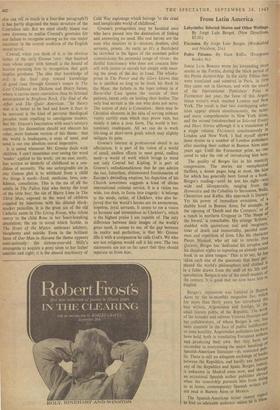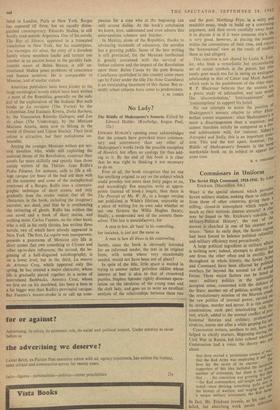From Latin America
JORGE Luis BORGES wrote his astounding short stories in the Forties, during the black period of the Peron dictatorship. In the early Fifties they were translated and admired in Paris, in 1959 they came out in German, and with the award of the International Publishers' Prize at Formentor last year, the fame of this Argen- tinian writer's work reached London and New York. The result is that two overlapping selec- tions appear almost simultaneously, the better and more comprehensive in New York alone, and the second (misdescribed as Selected Essays and Short Stories although it is a translation of a single volume, Ficciones) simultaneously in London and New York. I had myself shown these stories to a number of London publishers after meeting their author in Buenos Aires nine years ago. Until the Formentor prize, no one cared to take the risk of introducing him here.
The quality of Borges lies in his masterly
compression. The stories are metaphysical thrillers, a dozen pages long at most, the hint for which has generally been found in a book. Borges's reading—until he lost his sight—was wide and idiosyncratic, ranging from the Hermetica and the Cabalists to Stevenson, Wells, Chesterton and Kafka. His approach is literarY. Yet his power of immediate evocation, of a shabby hotel in Buenos Aires, for example, in, the opening of 'Death and the Compass,' or of a ranch in northern Uruguay in 'The Shape of the Sword,' is remarkable. His strange 'fictions, studded with quotations real and imaginary, treat of death and immortality, parallel exist- ence and repetition of lives. Like his character Pierre Menard, who set out to rewrite Doti Quixote, Borges has 'dedicated his scruples and his sleepless nights to repeating an already extant book in an alien tongue.' That is to say, he has taken each one of the questions that have Per- plexed the world's philosophers and clothed it in a fable drawn from the stuff of his life and speculation. Borges is one of the small masters ,. English.
Borges's Ii is good that we now have him in Borges's reputation was fostered in Buenos
Aires by the bi-monthly magazine Sur, which for more than thirty years has introduced the best writers, Argentinian and foreign, twalk small literate public of the Republic. The
of the founder and editress Victoria OcamPo
her collaborators, of whom Borges is one, has been constant in the face of public indifference : or even hostility. Argentinian publishers too have been bold, both in translating European authors and producing their own. But they have II°t
,
succeeded in overcoming the major handicap .c- Spanish-American literature—its restricted PuTs lie. There is still no adequate exchange of bow" between the Republics, and hardly any ben
deed of the Republics and Spain. Borges, indeed:
is unknown in Madrid even now, and thought; an occasional Spanish author publishes ahru_au,, when the censorship prevents him from d°111_ not nso at in Buenos Aires or contemporary al` The Spanish-American writer cannot expect ..I to find an adequate audience unless he is trail')
lated in London, Paris or New York. Borges has captured all three, but an equally distin- guished contemporary, Eduardo Mallea, is still hardly read outside Argentina. One of his novels, The Bay of Silence, appeared in a truncated translation in New York, but his masterpiece, Los enemigos del alma, the story of a decadent family whose members loathe and torture one another in an ancient house in the garishly fash- ionable resort of Bahia Blanca, is still un- translated. Mallea poses problems of conscience and human isolation. He is comparable to Mauriac, and of similar stature.
American publishers have been kinder to the large sociological novels which have been written a most of the Republics, generally on the sub- ject of the exploitation of the Indians. But such books as La vordgine (The Vortex) by the Colombian Jose Eustasio Rivera, Dotia Barbara, by the Venezuelan Romulo Gallegos, and Los de abafo (The Underdogs), by the Mexican Mariano Azuela, seem now to belong in the world of Dreiser and Upton Sinclair. Their local colour is attractive, but their melodrama un- bearable.
Among the younger Mexican writers are sev- eral novelists who, while still exploiting the national theme of the Revolution, construct their novels far more skilfully and sparely than those untidy writers of the Thirties. Juan Rulfo's Pedro Pdramo, for instance, calls to life a vil- lage cacique (or boss) of the bad old days with all the economy and some of the metaphysical overtones of a Borges. Rulfo uses a cinemato- graphic technique of short scenes, and only gradually does the reader realise that all the characters in the book, including the imaginary narrator, are dead, and that he is overhearing the twittering of ghosts. Rulfo has written this one novel and a book of short stories, and nothing more. Carlos Fuentes, on the other hand, who is still in his early thirties, has written three novels, two of which have already appeared in New York. The first, La region ma's transparente, presents a panorama of Mexican city life in short scenes that owe something to Ulysses and other up-to-date influences; the second, the be- ginning of a half-disguised autobiography, is on a lower level, but in the third, La muerte de Anemia Cruz, which appeared only this spring, he has created a major character, whose life is gradually pieced together in a series of interrelated flashbacks. Artemio Cruz, whom we first see on his deathbed, has been a boss in a far bigger way than Rulfo's provincial cacique. But Fuentes's master-stroke is to call up corn- passion for a man who at the beginning can only arouse dislike. At the book's conclusion we know, love, understand and even admire this unscrupulous schemer and butcher.
In Mexico, alone of the Republics, thanks to advancing standards of education, the novelist has a growing public. Some of the best writing is still provincial, for the Mexican intellectual is greatly concerned with the survival of Indian cultures and the impact of the Revolution upon them. Baldn Conan by the poet Rosario Castellanos (published in this country some years ago by Faber under the title The Nine Guardians) is an outstanding treatment of this theme. But re- cently urban subjects have come to predominate.
J. M. COHEN



































 Previous page
Previous page